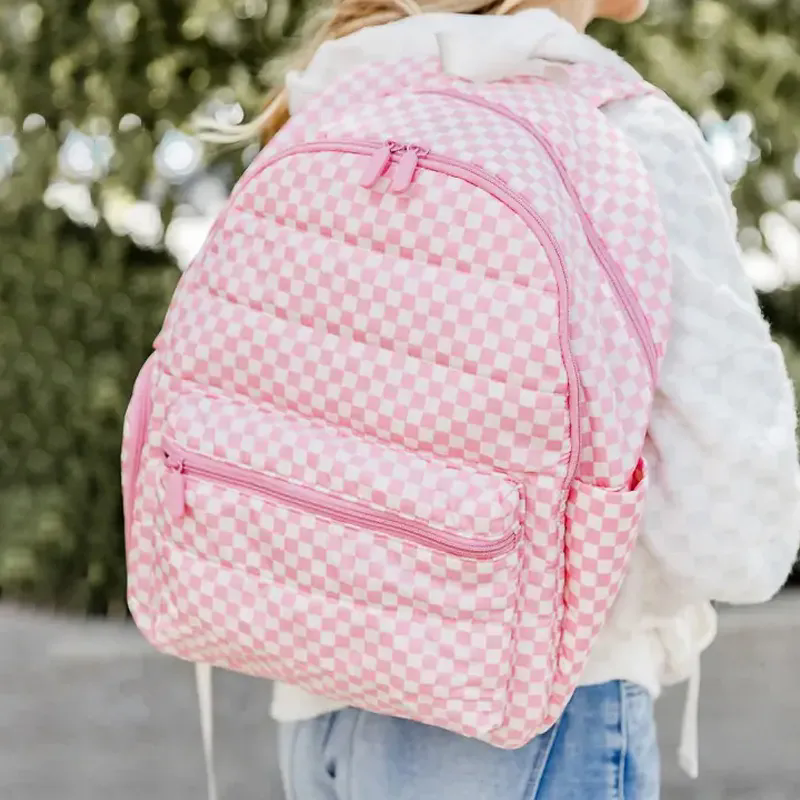Why Are Children’s Backpacks So Important for Their Daily Life?
2024-11-09
When it comes to preparing children for school or outdoor adventures, one of the most essential items they need is a backpack. More than just a convenient way to carry books, lunchboxes, and stationery, a children’s backpack plays a key role in their health, organization, and overall well-being. But what makes children’s backpacks so important, and how do you choose the right one for your child? Let’s take a closer look at why these backpacks are more than just a simple accessory.
1. Practical Functionality and Convenience
A children’s backpack is designed to help kids organize and carry their daily essentials in a safe and convenient manner. Whether it’s for school, a weekend trip, or extracurricular activities, a backpack allows children to have their hands free while keeping everything they need easily accessible. Most backpacks come with multiple compartments for books, stationery, snacks, and even water bottles, making it easier for children to organize their belongings.
2. Comfort and Health
One of the most significant benefits of a well-designed children’s backpack is the impact it has on a child’s comfort and physical health. Many backpacks for kids are crafted with padded shoulder straps and back panels to distribute the weight evenly across their back. This helps prevent shoulder and back strain, which is a common issue when children carry heavy bags improperly.
The importance of ergonomics in children’s backpacks cannot be overstated. When choosing a backpack, it’s important to select one that fits the child properly and doesn’t overload them with too much weight. Backpacks that are too large or heavy can lead to posture problems, muscle strain, and even long-term health issues. Look for options that are designed to be lightweight, with adjustable straps to ensure a perfect fit as the child grows.
3. Aids in Organization and Responsibility
Children’s backpacks also help teach kids important life skills like organization and responsibility. With dedicated compartments for different items, children learn to keep their things tidy and manage their belongings independently. From storing pencils and notebooks to keeping their lunch separate from school supplies, a well-organized backpack helps children stay on top of their daily tasks and reduces the chances of losing things.
In addition, carrying a backpack encourages children to take responsibility for their own belongings. They learn to pack and unpack their bag for school, remember to take homework home, and ensure that all their supplies are ready for the day. These small tasks foster a sense of independence and self-sufficiency in young learners.
4. Style and Personal Expression
Beyond their functional benefits, children’s backpacks often reflect their personalities and interests. From backpacks featuring popular characters, animals, or vibrant colors, these accessories allow children to express themselves and feel excited about going to school or embarking on new adventures. A backpack can become a part of a child’s identity, and choosing one that they love can motivate them to take care of it and use it every day.
For parents, choosing a backpack that suits their child’s tastes is also an opportunity to engage with their child’s interests and preferences. Whether they choose a superhero-themed bag, a backpack with fun patterns, or one inspired by nature, the backpack can be a source of pride and joy for children.
5. Durability and Safety
A quality children’s backpack is made to last, even through rough play and daily wear. Children are known for their active lifestyles, so it’s essential to invest in a backpack that can withstand constant use. Look for backpacks made from durable materials such as polyester, nylon, or canvas, which can endure spills, dirt, and rough handling.
Additionally, safety features like reflective strips are an important consideration. Many backpacks come with reflective materials that increase visibility, especially for younger children walking to school in the early morning or late afternoon. This simple addition can improve a child’s safety by making them more visible to drivers.
6. Encourages Healthy Habits for Physical Activity
A children’s backpack isn’t just for carrying school essentials—it can also be a tool to encourage physical activity. Many kids use their backpacks for sports, gym class, or hiking trips. Choosing a backpack with ample space and compartments for sporting gear, shoes, or water bottles can make it easier for children to stay active and engaged in physical activities. Encouraging them to take their bag to extracurricular activities ensures they are prepared for anything, whether it’s a soccer game or an afternoon at the park.
7. Conclusion: A Simple Accessory with Big Benefits
When you think about a children’s backpack, it might seem like a small and simple item, but it plays a significant role in a child’s daily routine and well-being. A good backpack not only helps carry their belongings but also contributes to their health, comfort, and development. It fosters independence, organization, and personal expression while promoting good posture and safety. Whether your child is heading to school, a playdate, or an outdoor adventure, the right backpack can make all the difference in making their experience more enjoyable and efficient.
So, next time you're choosing a backpack for your child, remember that it's not just about style—it's about functionality, comfort, and the positive impact it can have on their daily life.



